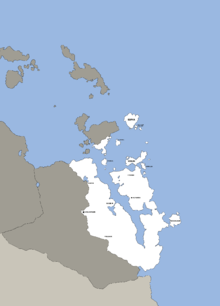Eldengarde
| This page is a work in progress by its author(s) and should not be considered final. |
| The High Lordship of Eldengarde Eldengarde
|
|||
|---|---|---|---|
|
|||
| Motto: "Ahkos voth zin, fah nii los aaz" "Live with honor, for it is mercy." |
|||
| Anthem: "Thu'um!" "Shout!" |
|||
Eldengarde in 1350 AD.
|
|||
| Capital | Volunruud | ||
| Largest city | Rokir | ||
| Official languages | Wuthzul | ||
| Recognised regional languages | Old English | ||
| Ethnic groups | Eld (95.65%), Alt (4.26%) | ||
| Demonym | Eldengardian | ||
| Government | Kingdom | ||
| - | Harbinger | Ragnar Ulfbert (at time of dissolution) | |
| - | Head Councilor | Ahrotviiltuth (at time of dissolution) | |
| High Lordship | |||
| - | Founding of the Kodiist Kingdom | ~3851 BCE | |
| - | Splintering of the Kodiist Kingdom | July 17, 3001 BCE | |
| - | Dissolution of Eldengarde | July 27, 1394 CE | |
| Area | |||
| - | Total | 3,107,399 km2 1,199,773 sq mi |
|
| - | Water (%) | 29% | |
| Population | |||
| - | 1393 estimate | 73 million | |
| Currency | Vonik | ||
| Time zone | WHST | ||
The High Lordship of Eldengarde (pronounced //) or Zuwuthskuld in Skarzul was a kingdom that existed from 491 BCE to 1394 AD. It was situated in what is today eastern Hawkwick, and was bordered on the east by the Altberg Empire.
The original Altberg and Eldenheim nations were composed of descendants of the same group of people, known to the Eldenheim as the Kodiist, who inhabited Hlymrek around 4000 BCE. After the Kodiist Kingdom's dissolution, the two empires became distinct ethnic groups, but nevertheless the claim that the Eldenheim Harbinger held on the Altberg Empire persisted until 1394 AD, when the heir of the Altberg Empire, Ragnar Ulfbert, killed the Harbinger of Eldengarde in personal combat, along with his half-sister, therefore making him the next Harbinger as well as the next Altberg Emperor. Eldenheim was a major power in northwestern Audax for over 1800 years, during which they amassed much power and wealth as one of the leading trade powers of the world. Today, Eldenheim is fully absorbed into Hawkwick, but a variant of it's language, Wuthzul, still persists today as Skarzul, and many of it's customs persist in the modern day, such as the Luftnu Rahzun doctrine.
Eldenheim was a country of elective succession where the head of the government, the Harbinger, was either elected by a moot of the Elder Council and his vassals, or by formal combat, where his slayer became the next Harbinger. Near the end of it's existence, several democratic reforms were put in place, but they were halted by Hakonor, the last independent Harbinger.


